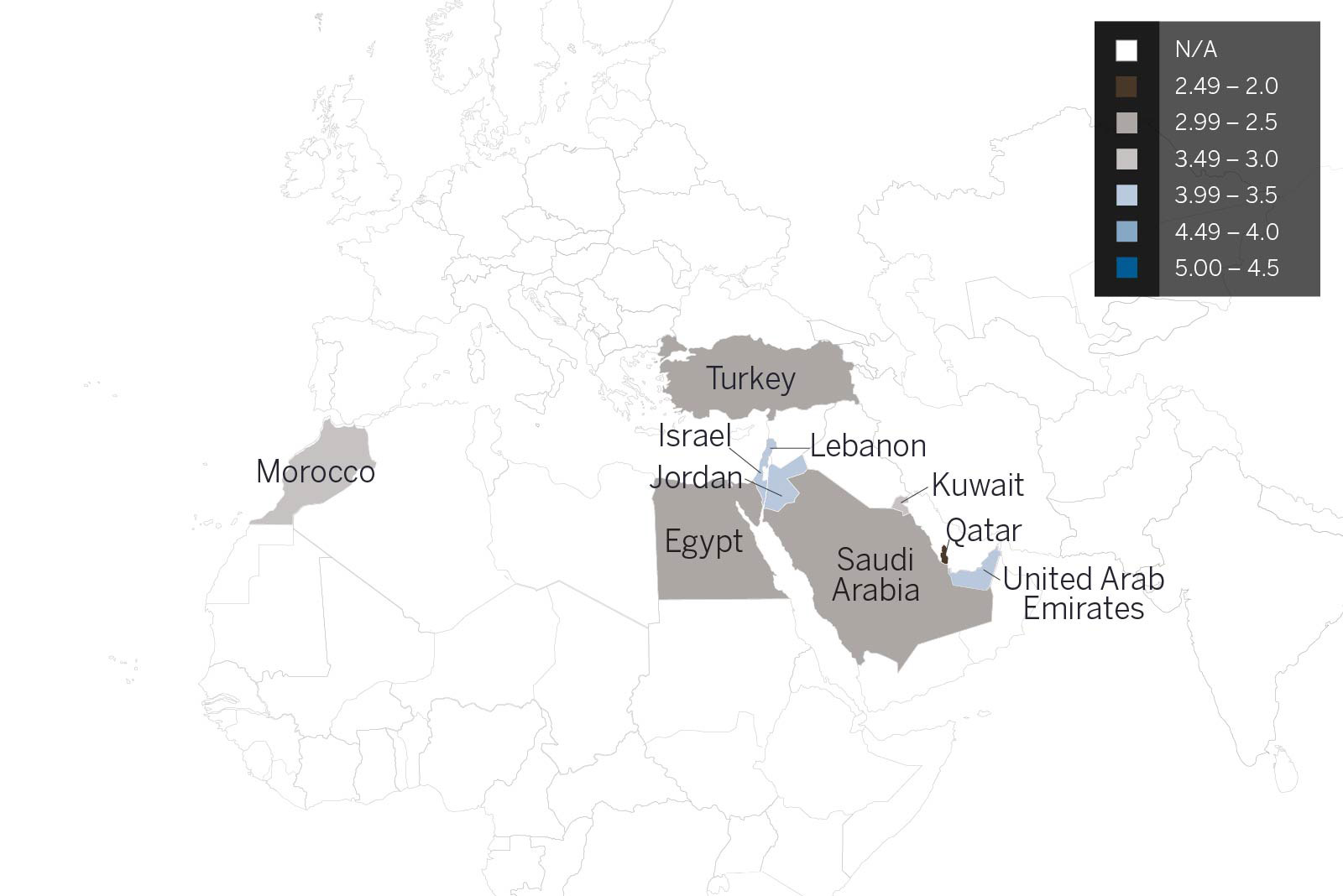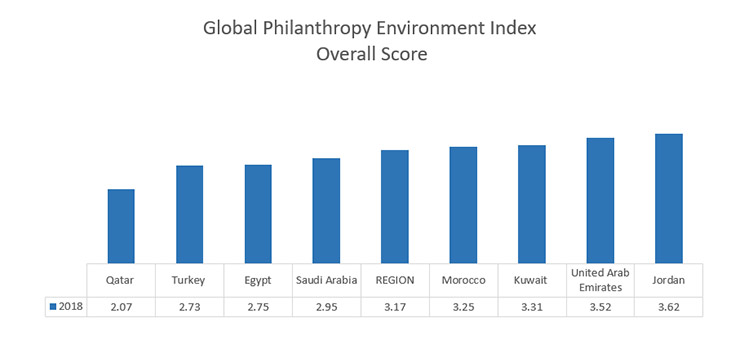The Economist Intelligence Unit’s Democracy Index scores countries on a scale of 0 to 10 based on five categories including electoral process and pluralism, civil liberties, the functioning of government, political participation, and political culture. According to the Democracy Index 2017, these 10 countries were scored variedly: Saudi Arabia is at the lowest ranking with a score of 1.93, while Israel is at the highest with a score of 7.77 even though it is still considered in the Index as a flawed democracy.
The Index labels Israel as flawed democracy; Lebanon, Turkey, and Morocco as hybrid regimes; and Jordan, Kuwait, Egypt, Qatar, Saudi Arabia, and the United Arab Emirates as authoritarian regimes (though the United Arab Emirates is a federal Emirate where state power is shared by the rulers of seven constituent Emirates (states) forming the Federal Supreme Council).
The Index reports positive developments of democracy in 2016 for Egypt and Morocco. Israel, a country that has worked to strengthen its public institutions, still maintains a climate of huge disparities between the rights enjoyed by Jewish citizens and the growing Muslim-Arab population.
The level of education in the countries also varies widely, measured in terms of the percentage of population age 25+ with at least a completed short-cycle, tertiary degree (ISCED 5 or higher). In 2015, 47.1 percent of the world population had completed a short-cycle tertiary degree, while in Turkey it was only 17.4 percent (UNESCO Institute for Statistics).
Available statistics also show that the figures are low in the other countries in the list: 16.2 percent in Jordan (2010); 9.6 percent in Kuwait (2012); 20.9 percent in Qatar (2012); and 21 percent in Saudi Arabia (2013).
The wave of the civil protests and uprisings (the “Arab Spring”) that took place in the Middle East and North Africa early in 2011 led to the removal of the dictators in Tunisia, Yemen, Egypt, and Libya, and influenced the political environment in several countries in the region. Six years later, the Arab Spring has turned into the so-called Arab Winter, giving way to stagnation in the transition to democracy, together with rising Islamic extremism; economic stagnation; political turmoil; and civil wars in Syria, Libya, and Yemen that have resulted in the deaths of hundreds of thousands of civilians.
But political turmoil has not obstructed significant growth of international philanthropy in the region in the form of humanitarian assistance to stabilize a particularly volatile socio-political environment. Major violence, conflicts, and persecution in Syria, Yemen, and Iraq have displaced millions of people internally, and created a need for humanitarian help in the region (Internal Displacement Monitoring Center, 2017).
These emerging needs have raised the interest and concern of governments and private donors (individuals, corporations, trusts, foundations, and/or national societies) for contributions to domestic and regional stability. According to the Global Humanitarian Assistance Report (Development Initiatives, 2017), in 2016 the “largest numbers of refugees were in three countries neighboring Syria: Turkey (host to approximately 2.87 million refugees), Jordan (2.83 million) and Lebanon (1.47 million)” (p. 18).
In 2015 and 2016 the Syrian crisis was the largest recipient of private funds, and private donations to “Greece, Macedonia, Serbia, and Turkey reached a combined total of US $71 million – approximately 13 percent of total international humanitarian funding for the crisis” (Development Initiatives, 2017, p.50).
The internally displaced persons (IDPs), and the refugees who have been crossing into the neighboring states following political instability in Iraq, and civil war in Syria, fueled the now-defeated non-state actors and affiliate radical groups to force many countries in the region to place restrictions to the operation of civil society organizations (United States Agency for International Development, 2016).
Some of the countries in this report have experienced varied forms of internal civil rights disparities and longstanding ethnic and religious conflicts that have resulted in changes in governmental action and influenced the philanthropic environment. Amid these political crises in the region, the GCC countries have been making efforts to modernize their economies and engage in social reforms that may provide opportunities to increase women’s economic empowerment and participation in the labor force. The recent royal decree issued in September 2017 in Saudi Arabia allowing women to drive starting from June 2018 is a move towards important economic and social reforms in this country.
Many governments sponsored campaigns, like the Year of Giving and Dubai Cares in the United Arab Emirates, Vision 2030 in Saudi Arabia, and the creation of the Higher Committee for Charitable Work in Kuwait, that have contributed to raising awareness of the impact of charitable giving. Further, many royal foundations and billionaires have helped to elevate the philanthropic profile of the region.
In 2015, the Sheikh Mohammed, Vice-President and Prime Minister of the United Arab Emirates and Ruler of Dubai launched the Mohammed bin Rashid Al Maktoum Global Initiatives (MBRGI). At a larger scale, billionaires like Sunny Varkey (Dubai-based entrepreneur), PNC Menon (Dubai-based), Prince Al-Waleed bin Talal (Saudi Arabia), and Hamdi Ulukaya (Turkey) have joined the Giving Pledge, a movement founded in 2010 by Warren Buffet and Bill and Melinda Gates to pledge portions of their fortunes to philanthropic causes.
Nonetheless, the fact of the matter is, as concluded in the Democracy Index 2017, the democratic environment worsened in the world. The changes in the democratic environment are likely to impact the philanthropic environment in the world as well as the Middle East and Northern Africa region – the focus of this report.



